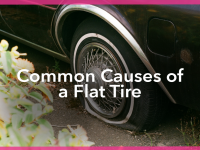Flat tires are inconveniences that no driver ever wants to deal with. However, the unfortunate truth is that they do happen. And when they do, there isn't really anything that you can do to prevent that from happening — or is there? To find out, let's take a look and explore what some of the most common causes of a flat tire are:
Poor Road Conditions
While construction and renovations seem to be increasing nowadays, not all roads are being worked on — especially if you don't live in the city. There are lots of roads with old pavement, rocks, bumps, and potholes that can take a toll on your tires. While it's better to steer clear of these roads when you know the area and how to get around them, you can't always prevent them — especially if you're driving out into a new area.
Foreign Objects
Another common cause of a flat tire is foreign objects. On the road, your car might pick up old debris, nails, and other objects that embed into your tires and cause punctures. As a result, your tires might suffer from holes and rips that cause deflation. These objects might be so small and hard to detect that you fail to notice them, which is why it's important to check on your car regularly.
You Haven't Changed Them in a Long Time
Another common cause of flat tires is old age. Over time, they start to wear out and lose some of the high-quality and strength that they had when they were new. That's because poor road conditions, foreign objects, weather conditions, and other factors can cause them to wear and tear over time. It's recommended to replace your tires once approximately every six years to stay safe and prevent them from completely wearing out.
Overloading Your Vehicle With Too Much Weight
This is a common cause that happens when drivers head out on road trips. It can also reduce your car's fuel efficiency and drive up your gas expenses, as your car will have to work harder to run. When heading out on the road, try to avoid overloading your vehicle with too much weight, as that will take its toll on the tires (and on your budget). Pack the essentials and leave anything that you might not need at home.
Failing to Inflate Them Properly
It's important to make sure you get your tires inflated properly, as both over-inflating and under-inflating can be dangerous. That's because in both situations your tires won't be inflated with the right amount of air to function properly, which can ultimately lead to a blowout.
To prevent blowouts and get your tires inflated properly, or if you're looking to get your old tires replaced with newer, high-quality ones, contact the professionals at All in the Wrist. Our auto experts have the knowledge and expertise from years of training and on-the-job experience of working with cars, and they will be able to help you. You can reach out to us online or via phone at (505)-242-9778 for more information.








